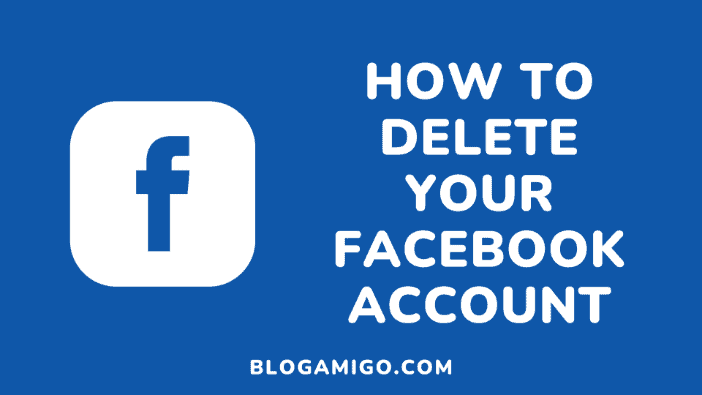If you wish to take a walk away from Facebook, you can delete your Facebook account from the platform.
We’ve all been distracted by social media at one point or another, but before you take a step back, consider whether you want to quit using Facebook partially or completely.
Keep in mind that deleting your Facebook account will prevent you from using Facebook Login for other apps that you may have signed up for using your Facebook accounts, such as Pinterest or Spotify.
To retrieve those accounts, you may have to contact the websites and apps. Your Facebook Messenger account will be deleted as well; however, your Instagram account will remain operational.
In this article, I’ll be guiding you through the simple steps to follow if you want to call it to quit with Facebook or want to delete your Facebook account permanently. You will also learn how to download your Facebook data before deleting your account.
See Also: How To Get More Likes On Facebook: The Beginner’s Guide
Deleting or Deactivating Your Facebook Account, What Does it Mean?
The most significant distinction between deleting and deactivating a Facebook account is that deactivating your account allows you to return at any time, whereas deleting your account is a permanent step.
On the other side, deleting an account is irreversible. You won’t be able to get back into the account once it’s been deleted, and everything related to your account will be lost forever.
As a result, Facebook holds off on deleting your information for a few days after you submit your request, just in case you change your mind. It can take up to 90 days for all of your information stored on Facebook’s backup servers to be permanently destroyed once your account is canceled.
Your timeline, images, friends’ lists, including posts and “about” information, is hidden when you deactivate your account, and others won’t be able to search for your account.
However, certain information stays visible, such as messages you’ve sent. Facebook saves all of your data (friends, comments, posts, videos, photos, and hobbies) in case you decide to reactivate it later.
Steps on How to Delete Facebook Account
1. At the top right corner of your Facebook page, click on the ”inverted” triangle.
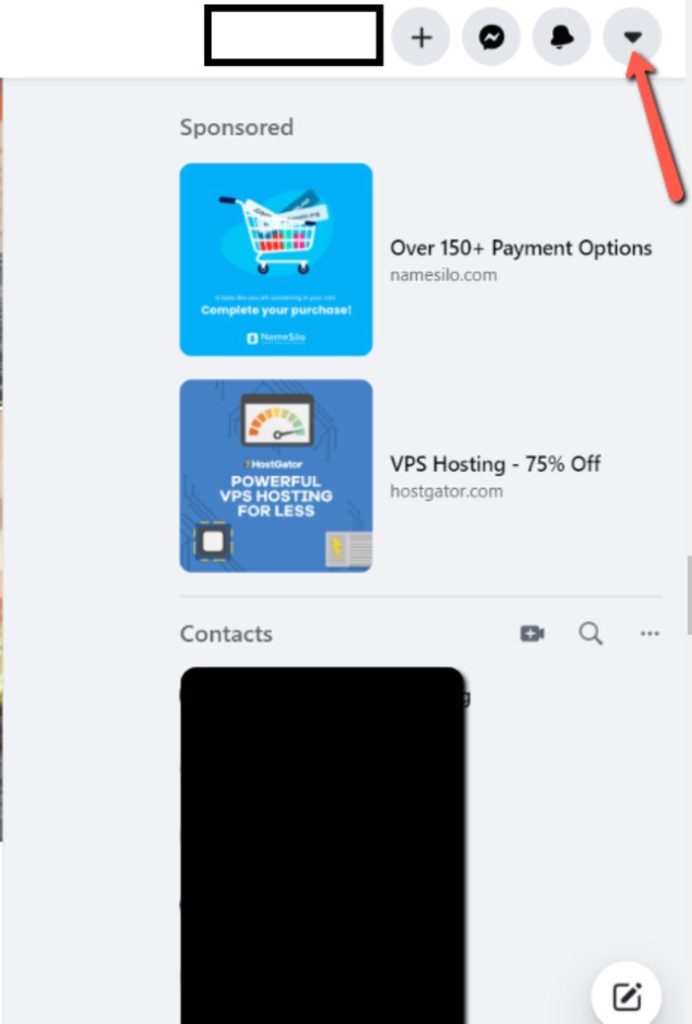
2. After that, you will need to select “Settings & Privacy” from the displayed drop-down menu.
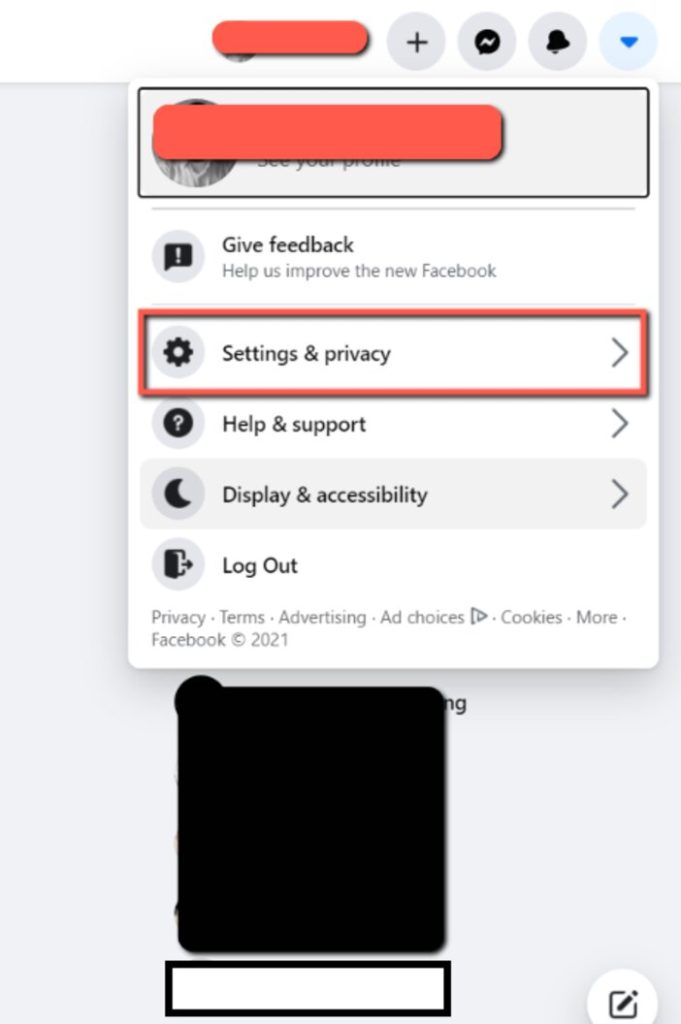
3. Then click on “Settings.”
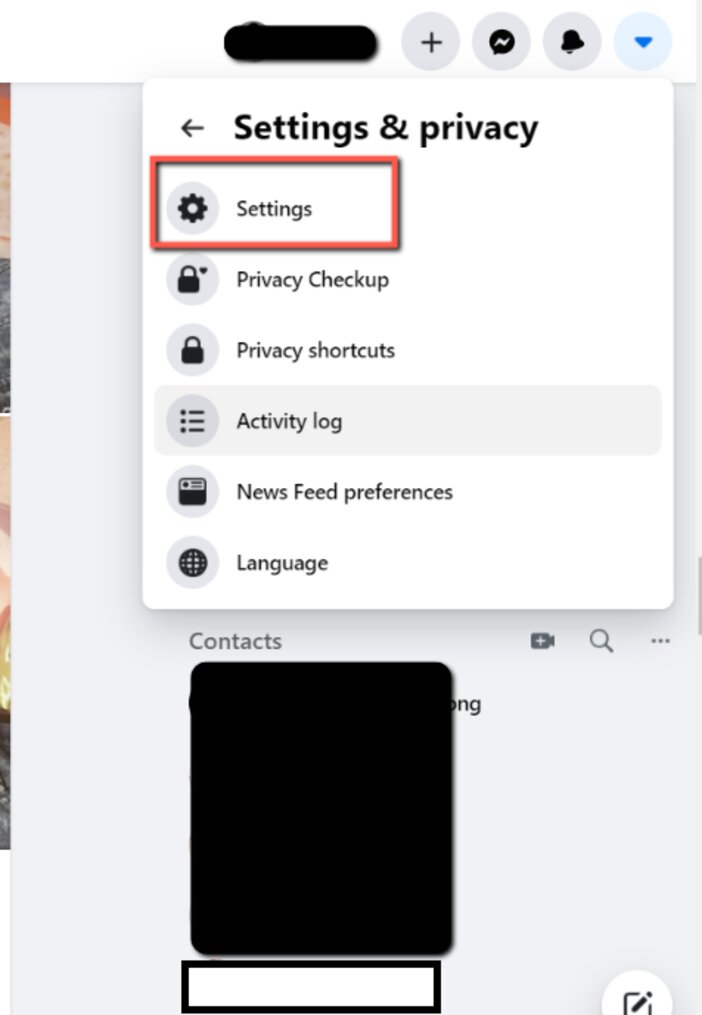
4. On the left-hand column, select “Your Facebook information.”
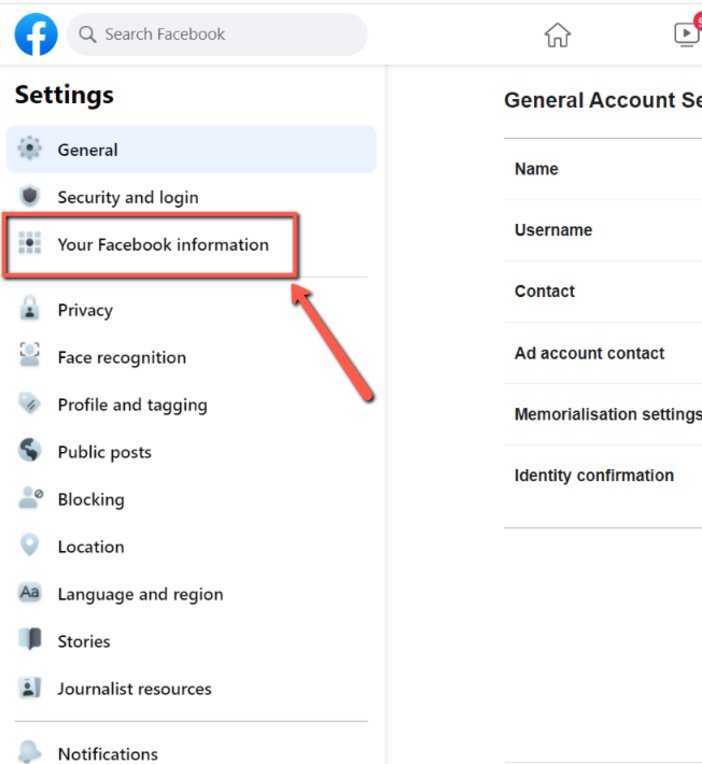
5. Click on “Deactivation and Deletion.”
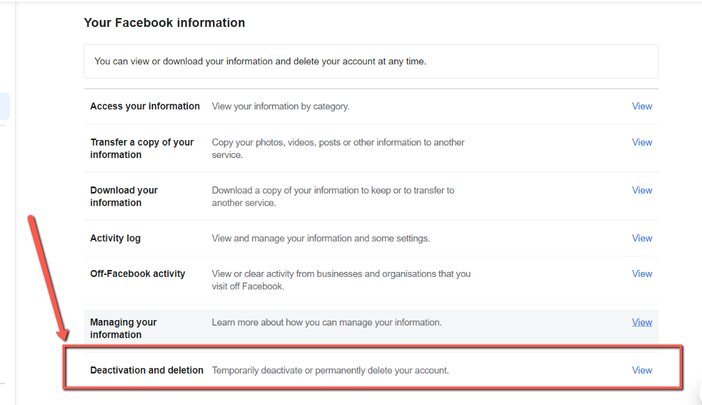
6. After you select “Delete Account,” you will need to click on the “Continue to Account Deletion” icon.
![How_To_Delete_Facebook_Account[1]](https://blogamigo.com/wp-content/uploads/2021/07/How_To_Delete_Facebook_Account1.jpg)
7. Finally, you will have to insert your ”Password” and click on “Continue.”
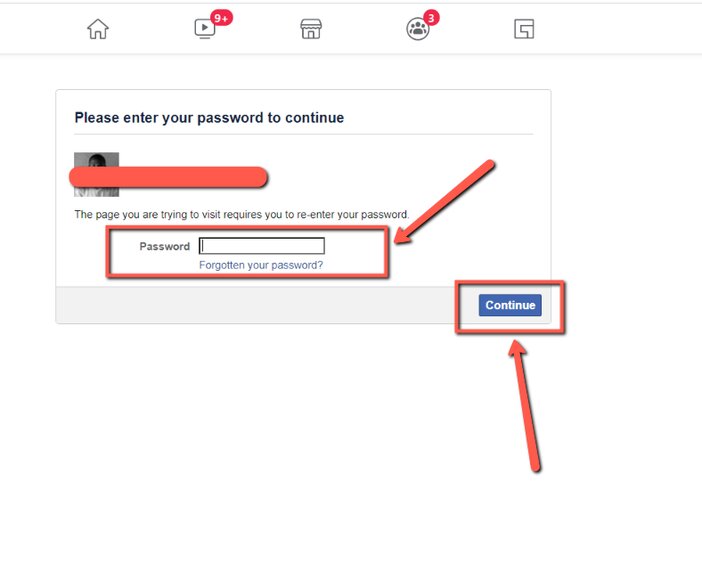
NOTE: You’ll then be notified that Facebook is deleting your account on your behalf and that you won’t be able to revive it. It’s worth noting that after you delete your account, you won’t be able to retrieve it back.
Before you delete your account, Facebook suggests downloading a copy of your data so you don’t lose anything you’ve shared. This is particularly crucial if you wish to save photos or updates from friends.
How Download Facebook Data
1. At the top right corner of your Facebook page, click on the “inverted” triangle.
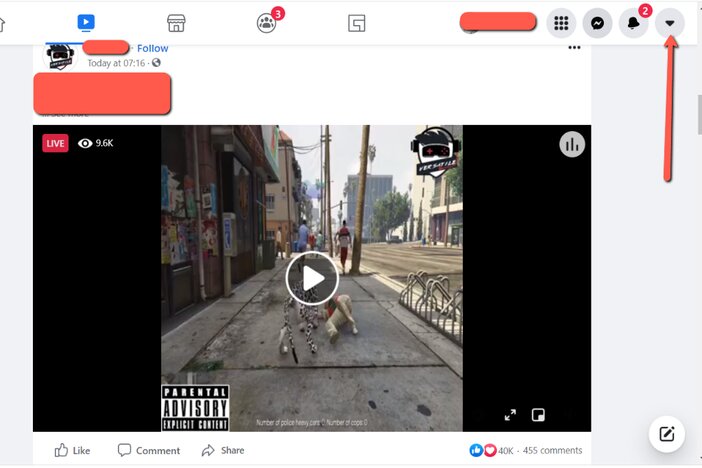
2. After that, you will need to select “Settings & Privacy” from the displayed drop-down menu.
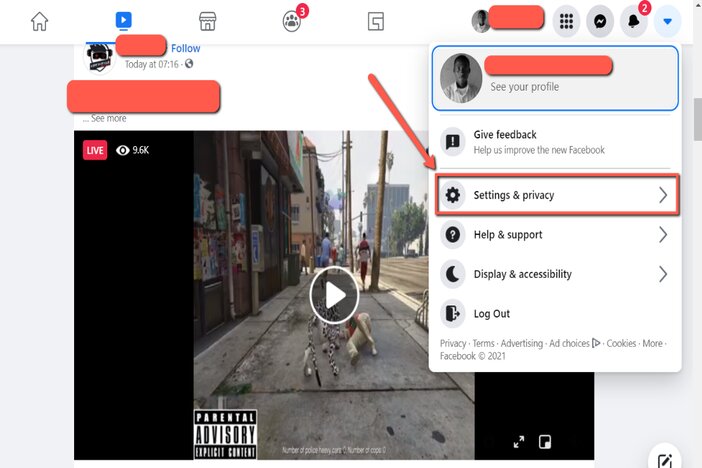
3. Then click on “Settings.”
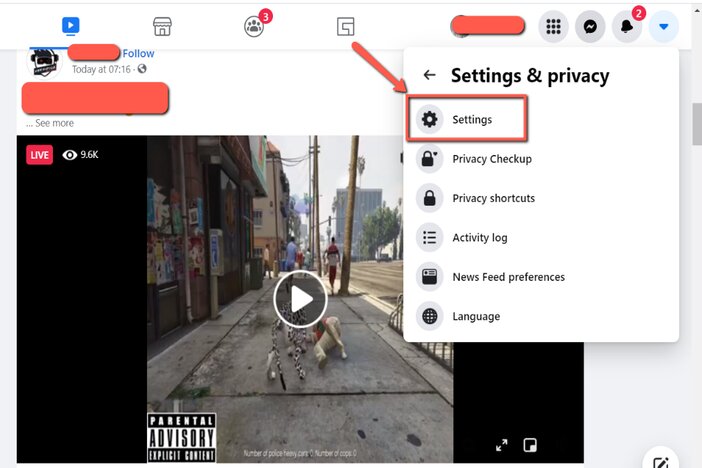
4. On the left-hand column, select “Your Facebook information.”
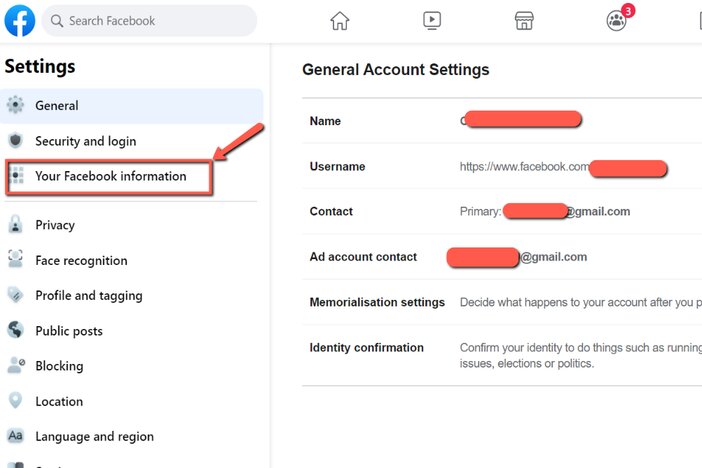
5. Select “Download Your Information.”
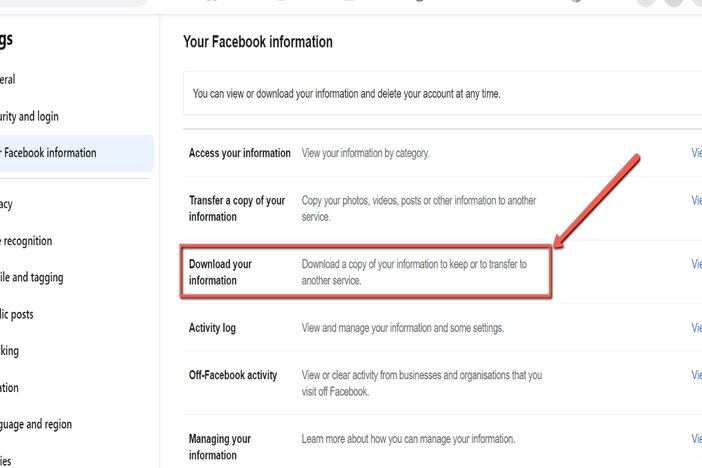
6. Select the file type, video, and photo quality.
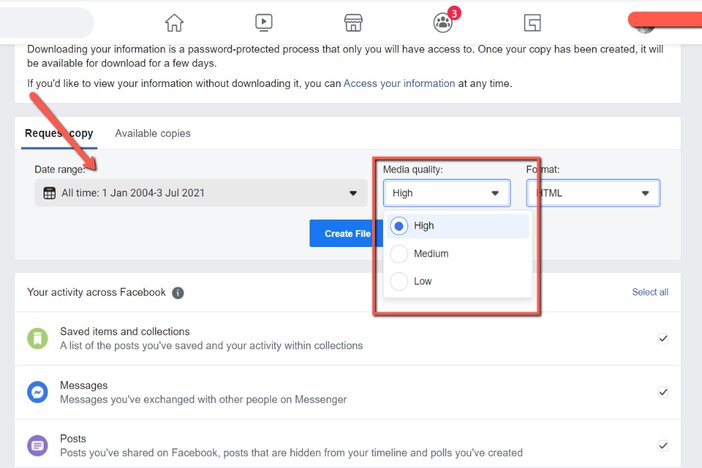
7. To confirm your request, you will need to click “Create File”.
8. You will receive a notification when your download request is ready.
9. Return to the “Download Your Information” page (click on the “inverted” triangle>> “Settings& privacy”>> “Settings”>> “Your Facebook Information”>> “Download Your Information”).
10. Click “Download.”
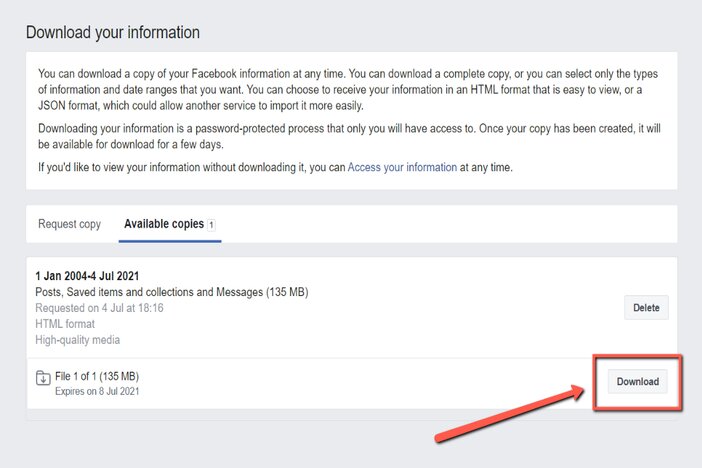
See Also: How To Launch Your Own Facebook Group And Get Loyal Fans
What To Do Before You Delete Your Facebook Account
Since deletion is irreversible, here’s a checklist of things you should do before calling it quits.
Make contact with any friends or family members you’d like to stay in touch with. So you don’t have to keep yourself off from them, ask for their most recent emails, phone numbers, or any third-party chat they may have.
Think about saving and downloading the images you’ve shared. Rather than sifting through them one after another, the quickest approach to retrieve all of your photos is to get a copy of all of your Facebook data.
This will collect all of the data Facebook has on you, such as your photos, ad settings, login times, messages sent, events attended, and much more. The option to download everything can be found in your Facebook page settings section.
You’ll need to modify any third-party apps that are tied to your Facebook account so you don’t get locked from several other accounts. If possible, redirect them to your email or another service.
Finally, you may choose to withdraw your Facebook app permissions from any apps you’re using or haven’t used in the past. These choices can be found in the “Apps” menu of your account settings.
Best Facebook Alternatives
If you’re serious about quitting Facebook, there are other social media platforms can serve as an alternative to Facebook that you can check out.
1. Instagram
Opting to Instagram full-time isn’t a bad idea if you’re ditching Facebook as part of a goal to limit the number of apps on your phone or the number of sites you visit every day. The great percent of your Facebook connections are almost certainly already there.
Many of them will already be updating their Instagram pages with photos of their families and other life events. The best aspect is that the majority of Instagram users avoid talking about politics, current events, or religion, unlike Facebook. Win-win.
If you’re leaving Facebook because you’re worried about your personal and private information. Instagram isn’t for you. Since it’s closely connected to Facebook, any privacy concerns you had with Facebook’s data collection might equally relate to Instagram.
2. Twitter
Twitter another Facebook alternative, which is almost as fast-growing as Facebook and is one of Facebook’s greatest rivals.
While it is the home for smaller posts and tweets, it is a fantastic medium that has ensured that some of the world’s problems are brought to everyone’s attention. Twitter is, without a doubt, one of the most entertaining and user-friendly social media platforms.
3. LinkedIn
LinkedIn is another popular Facebook alternative. It is renowned among professionals and is expected to remain so. LinkedIn allows you to connect with other experts, hire staff, and look for new opportunities.
It’s a fantastic place to keep up with industry trends and information. You can use LinkedIn’s “Pulse” tool to communicate innovative ideas with large corporations.
4. Snapchat
Snapchat may have started as an anti-Facebook network for sending self-destructing picture messages to young and extra privacy-conscious audiences.
However, it eventually developed into a more feature-rich social media network, equipped with geographical photo tagging, entertaining face filters, and snippets of major news sources’ headlines.
5. TikTok
This video-sharing service, like Facebook, generates a fully tailored video stream so you can instantly access the types of videos that interest you.
You’ll always find a wide range of videos to watch, from comedy to gaming to memes, thanks to a large network of creators.
As a creator, you’ll have access to a plethora of eye-catching filters and extremely fantastical music to glam up your clips. In addition, Instagram Reels now allows you to share TikTok-style videos.
6. Pinterest
This platform is based on the idea of “pinning” fascinating photos, articles, web pages, and other information to virtual noticeboards, which can subsequently be shared with others.
You can make many pinboards for various interests, collections, events, or whatever else you choose. You can view and repin items from other people’s pinboards. Pinterest currently has over 72.8 million subscribers and is rapidly expanding.
7. Tumblr
Tumblr is a combination of a blog and a social networking platform. In a similar way to social networks, you can build your own blogs and follow others’. It had 420 million users, approximately 30-50 of whom were active, and over 220 million blogs.
See Also: 16 Ways To Grow Your Facebook Group 3x Faster
Frequently Asked Questions
1. Can I still view messages on Facebook if someone deletes their account?
You can see the conversation history from the Facebook chat function even if everyone deletes their account.
You won’t be able to respond to their messages or view their Facebook feed, profile photo, or previous posts.
The scenario is different if you are the one who is deleting your account. Your conversations will all be deleted and there is no means to recover them. All of your account information is likewise erased permanently.
2. How do I make my Facebook account hidden from others?
Blocking someone or adding them to your restricted list is a simple way of hiding your account from them.
You will still be friends with someone who is placed on your restricted list. They can only access your public information, though. This may include your posts, tags, photos, and other publicly available information.
3. What data does the Facebook data download include?
It contains any previous updates or modifications, as well as what is now in your timeline’s “About page”. Your account’s reactivation, deactivation, disablement, or deletion dates. Date, device, time, IP address, browser information, and device cookie are also included.
4. Can I retrieve my account back after it’s been deleted?
If it’s been less than 30 days since you started the deletion process, you can get it reversed. After 30 days, your account and all of your information will be permanently destroyed and you will be unable to restore it.
Once you initiate the deletion process, it may take up to 90 days to delete anything you’ve uploaded. Other Facebook users won’t be able to see this information while you’re deleting it.
See Also: 10 Best Social Media Automation Tools To Increase Engagement
Conclusion
Once you request deletion, Facebook will delay it for a few days. Your deletion demand will be reversed if you log back in during that time. So don’t sign in, or you’ll have to start the whole thing over.
However, after deleting your account, some information, such as comments you wrote on a friend’s post, might remain.
Facebook also claims that records of certain information, such as login records, will be retained in its server, but that they will be de-identified.
Before you delete your Facebook account, keep in mind that many apps require you to log in using your Facebook account.
It’s critical to disconnect all of your Facebook’s external connections so that nothing fails suddenly after your account is deleted. Creating new accounts inside your apps is sometimes necessary.
To get more information on how to grow your blog and social media accounts, I recommend you check out blogamigo.com.
